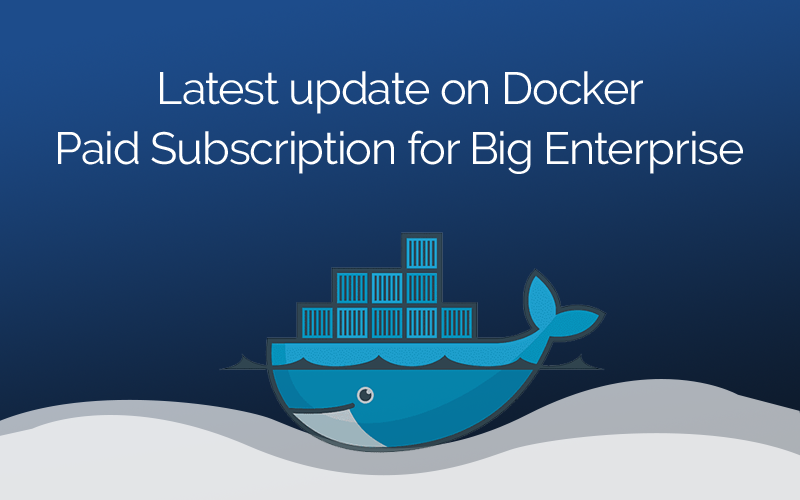Latest Update on Docker Paid Subscription for Big Enterprise
Docker will limit the free edition of its Docker Desktop application to individuals or small enterprises. The company hunts for a sustainable revenue model and has introduced a new and expensive subscription.
Docker Overview
Docker Desktop is a graphical user interface (GUI) for controlling Docker components and operations, such as containers, local Kubernetes, images, volumes (containers related storage), development environments within containers, and so on.
Docker Desktop is one of several components that make up the Docker platform. Container contents are defined via Docker images, and Docker containers are usually runnable instances.
The Docker daemon is an application that runs in the background and handles Docker containers and images. The Docker client is a command-line tool that uses the Docker daemon’s API. Images are stored on Docker registries, and the Docker Hub is a popular public registry.
Update on Docker Subscription
Docker has introduced a new Subscription Service. The firm has renamed its free plan “Personal” and now requires enterprises with 250 or more employees or annual revenue of more than $10 million to use a premium subscription if they need Docker Desktop.
In addition, Docker has introduced a new Business subscription package for larger enterprises with a significant number of users. Under the new Docker Personal plan, which replaces the previous Docker Free, Docker Desktop remains free for educational institutions, personal use, non-commercial open-source initiatives, and small enterprises.
Docker Engine and the Moby project are unaffected by the new service agreement, which solely applies to Docker Desktop. The overall software developers globally grew to 23,9 million, and it’s anticipated to reach 28,7 million by 2024. This change would not affect the individual developers who try to explore things securely.
Docker Business, as previously announced, is a new subscription package aimed exclusively at businesses. Organizations that utilize Docker at scale will benefit from additional capabilities such as single sign-on (SSO), secure software supply chain management, container registry access controls, and more.
The new terms went into effect on August 31. However, Docker gave developers until January 31, 2022, to comply with the latest service regulation and purchase a premium membership if necessary. The Docker Pro, Docker Team, and Docker Business memberships are available to developers.
This is part of a larger adjustment to Docker’s license conditions, as CEO Scott Johnston plots a comeback for the once-famous container startup, which sold its enterprise division to Mirantis in 2019.
Under Johnston’s leadership, the company’s remaining assets have transitioned to helping developers create containerized apps, principally through Hub image repository, Docker Engine container runtime, and Desktop application, which is currently installed on 3.3 million machines.
New Docker Concepts
Personal, Professional, Team, and Business are the new price options, which replace the old Free, Team, Pro, and Large programs. The Personal plan is still free, whereas the Pro plan costs $5 per month for individuals and $7 per month for teams. The new Business plan costs $21 per month per user.
Large corporate users—an enterprise plan in all but name—would need to pay for additional capabilities like single sign-on, registry limitations, and secure software supply chain management, which will require a paid subscription.
Customers with a Docker Personal account will continue to have free access to Desktop, along with Docker CLI, Docker Engine, Docker Compose, Docker Hub, and Docker Official Images. The upstream open-source Docker, Docker Engine runtime, and Moby projects have all remained unchanged.
Docker Consultant anticipates that the amended license terms for Docker Desktop reflect the goal to scale the business sustainably and ensure that all Docker subscriptions continue to provide value.
In an interview, CEO Scott Johnston stated security issues with the software supply chain that the business wishes to fix. Additionally, the company seeks a more successful business model. In the developer sector, we expect to see growth.
According to the most recent data, there will be 45 million worldwide developers by 2030, up from 18 million today, necessitating the development of a sustainable and scalable business.
The Docker announcement, as expected, triggered a debate among developers. While many people seemed to understand the reasoning behind Docker’s increased subscriptions, others expressed their displeasure. Criticism evolved along two distinct paths.
On the one hand, several people thought Docker’s action created a potentially dangerous precedent, raising the likelihood of future subscription prices and lock-in. Others argue that this view ignores the greater costs that a company would suffer if it were to rely on poorly maintained open-source software.
The majority of worries revolved around managing procurement activities within corporate entities, making it more difficult for developers to continue utilizing Docker and introduce various complexity.
As a result, many developers have begun investigating alternatives, such as Canonical-supported micro k8s, minikube, and others. Approaching a reliable docker consultant will help you make the right decision on your new development projects.
Recent Posts
Deep Learning Explained: Understanding the Brain Behind AI
The Intersection of AI and IoT: Creating Smarter, Connected Environments
The Evolution of AI: From Simple Algorithms to Neural Networks
The Role of AI in Sustainable Development
Scaling New Heights: Integrating Advanced Technologies in Startup Product Engineering
